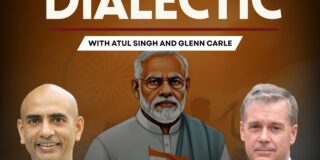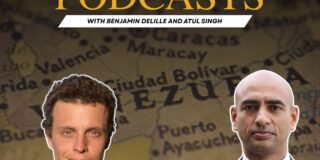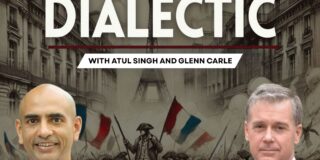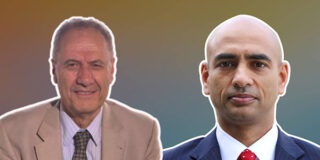In this edition of The Dialectic, Atul Singh and Glenn Carle delve into the factors that drew the United States into what became known as the Global War on Terror. This so-called war went on to define the global hegemon’s foreign policy for about 15 years.
Afghanistan’s Taliban regime had given refuge to Osama bin Laden and other al-Qaeda leaders. They planned and executed terror attacks against the US from their base in Afghanistan. In spite of US demands for extradition, the Taliban hosted al-Qaeda leaders. After the attacks of September 11, 2001, which killed more than 3,000 innocent people on US soil, the gloves came off. The US invoked NATO’s Article 5, calling all allies to its defense, an invocation unprecedented in history. The NATO allies, in cooperation with the local Northern Alliance, took Afghanistan by storm.
Bin Laden, who had expected a decadent, pluralistic and materialistic United States simply to fall over after an attack like 9/11, must have been sorely surprised by the ferocity of the US response. The allied invasion destroyed Taliban rule in just six weeks and inaugurated a new era in Afghanistan.
Trapped in Afghanistan
However, bin Laden escaped and this prolonged the US presence in Afghanistan. Soon, an Islamist insurgency led by the remaining elements of the Taliban broke out. President George W. Bush understood from the start that nation-building was an unrealistic goal and promised not to engage in it. However, the US soon found itself unable to pull out of Afghanistan.
The decision to remain was influenced by the assessment, which Carle regards as flawed, that al-Qaeda remained as a potent force in Afghanistan. The intelligence community sincerely believed that al-Qaeda continued to be a coherent and organized global existential threat to Western democracy. Carle points out that it is implausible that a secret resistance of any such magnitude would be able to maintain such hierarchical discipline, especially in such a fragmented country as Afghanistan.
The US had no plausible plan for victory, but felt compelled to stay. The cost of leaving, thereby enabling terrorists to regroup and tarnishing America’s credibility as a world power, was just too high. But it was a fool’s errand. Afghanistan is simply not a nation. It is a region populated by numerous ethnic groups, over whom the Pashtuns exert a dubious suzerainty. Pakistan, which has a sizable Pashtun population of its own, has a vested interest in keeping Afghanistan weak. It supported the Taliban chiefly to achieve strategic depth against India and to keep the influence of rivals like Iran and India weak in Afghanistan.
The Iraq Blunder
Building an Afghan nation was already impossible, but it was more than impossible by the diversion of resources toward Iraq, starting as early as the autumn of 2002.
Why, we must ask, did the intelligence community see Saddam as such a vital target? The Arab socialist dictator was no natural ally of al-Qaeda. He held many of their operatives in prison, and tortured them. Even still, the US administration managed to convince itself of a connection between the two.
At the time, terrorism concerns focused on state sponsors or state-like sponsors of terrorism: Libya, Iran, Pakistan and the Palestine Liberation Organization. US intelligence failed to recognize that al-Qaeda was a new type of threat, searching instead for a state as a culprit.
While Saddam had occasionally allowed terrorist factions to operate in Iraq, there was no evidence of coordination between the Ba’athist government and al-Qaeda’s high command. US intelligence officials mistakenly made the connection between Iraq and Afghanistan and neoconservative ideologues seized up this assessment. Ironically, this connection became reality when the US roped both unrelated wars into a single “Global War on Terror.”
American leadership did indeed have valid concerns that Saddam, who had previously pursued nuclear weapons, might seek them again and potentially use nuclear or biological weapons against Israel. The administration perceived Israel as an island of democracy, which America had a sacred duty to defend. Beyond security concerns, though, neoconservative elites in Washington saw Iraq as an opportunity to create an Arab democracy that would reshape the Middle East. As per their utopian vision, Iraq would serve as a beacon of democracy and, quite implausibly, as an example to Iran of what happens when a regime goes too far. In the end, the Iraq that emerged was much more amenable to the Islamic Republic’s interests than Iraq of Saddam Hussein. The Shias in Iraq are now under Tehran’s influence.
US leadership was mistaken on many points, but it was not simply irrational. The threat posed by international terrorism was real, and Americans had died. Perhaps, though, a more targeted, counterterrorism approach carried out by intelligence operatives and special operations teams might have better served the US administration. Washington needed a scalpel instead of a sledgehammer.
[Anton Schauble wrote the first draft of this piece.]
The views expressed in this article/podcast are the author’s own and do not necessarily reflect Fair Observer’s editorial policy.














Comment